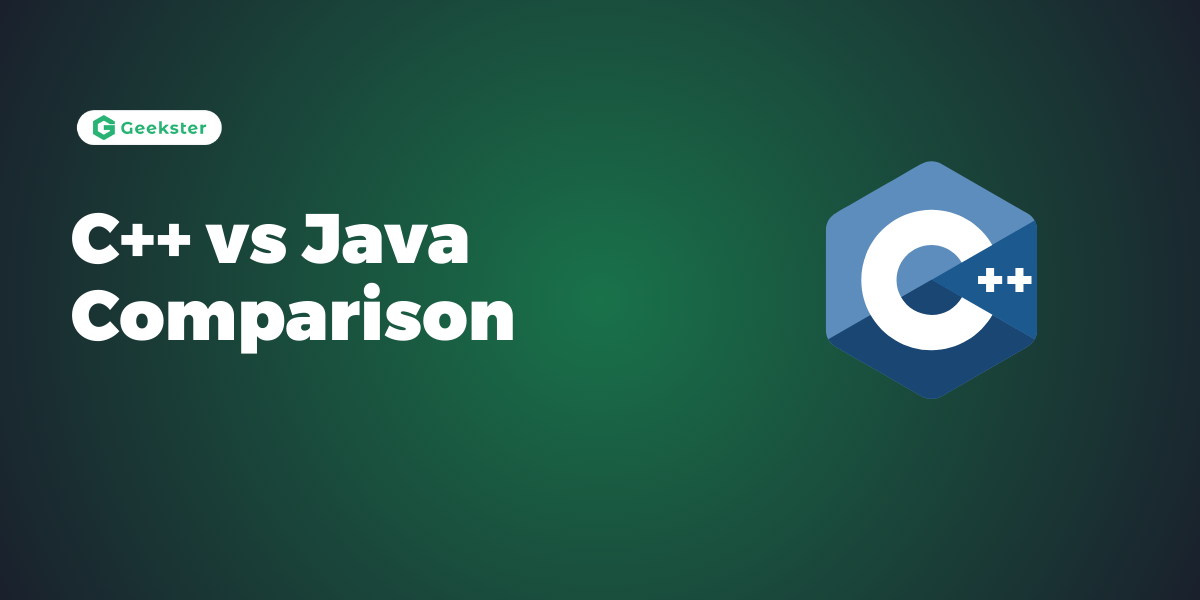Introduction
C++ vs Java, both are two popular programming languages for a wide range of applications. While both languages have some similarities, they also have important differences that make each one unique. In this blog, we’ll compare C++ and Java in order to understand their strengths and weaknesses, and which might be best for your needs.
Syntax and Structure
C++ Syntax
C++ is known for its flexibility and complexity. It supports both procedural and object-oriented programming. Here’s a simple example of a “Hello, World!” program in C++:
#include <iostream>
using namespace std;
int main() {
cout << "Hello, World!" << endl;
return 0;
}Java Syntax
Java is designed to be simpler and more readable than C++. It strictly follows object-oriented programming principles. Here’s how you write a “Hello, World!” program in Java:
public class Main {
public static void main(String[] args) {
System.out.println("Hello, World!");
}
}Memory Management
C++ Memory Management
In C++, you have more control over memory management. You can allocate and deallocate memory manually using new and delete:
int* ptr = new int; // Allocate memory
*ptr = 10;
delete ptr; // Deallocate memoryThis control is powerful but requires careful management to avoid memory leaks and other issues.
Java Memory Management
Java handles memory management automatically with its garbage collector, which frees up memory that is no longer in use. This reduces the risk of memory leaks but can sometimes affect performance:
int[] numbers = new int[10]; // Memory is managed automaticallyPerformance
| C++ | Java |
| C++ is generally faster than Java because it compiles directly to machine code. This makes it a good choice for applications where performance is critical, such as game development and system software. | Java is slower than C++ because it runs on the Java Virtual Machine (JVM), which adds an extra layer of abstraction. However, Java’s performance has improved significantly over the years, making it suitable for most applications. |
Platform Independence
| C++ | Java |
| C++ programs need to be compiled separately for each platform. This means that you need to manage different versions of your code for Windows, macOS, Linux, etc. | Java is designed to be platform-independent. Java programs compile to bytecode, which can run on any device with a JVM. This “write once, run anywhere” capability is one of Java’s biggest advantages. |
Use Cases
| When to Use C++ | When to Use Java |
| System software: Operating systems, device drivers. | Web applications: Server-side applications, enterprise-level applications. |
| Game development: High-performance graphics and real-time simulations. | Android app development: Java is the primary language for Android apps. |
| Applications requiring direct hardware manipulation | Large-scale enterprise systems: Banking, insurance, and retail systems. |
Conclusion
C++ vs Java, both have their unique strengths and weaknesses. C++ offers more control and performance, making it ideal for system-level programming and applications requiring high efficiency. Java, on the other hand, provides simplicity and platform independence, making it a great choice for web applications and enterprise solutions. Understanding these differences will help you choose the right language for your project. Happy coding!
Frequently Asked Questions
Yes, you can use both C++ and Java together in a single project. This is often done using Java Native Interface (JNI) to call C++ code from Java. This allows you to leverage the performance of C++ for critical parts of your application while using Java for higher-level logic and platform independence.
Java is generally considered easier for beginners due to its simpler syntax, automatic memory management, and extensive standard library. C++ can be more challenging because it requires manual memory management and has more complex syntax.
Java has a robust set of development tools and environments, such as Eclipse and IntelliJ IDEA, which provide powerful debugging, testing, and project management features. C++ also has strong tools like Visual Studio and CLion, but the setup and configuration can be more complex due to the language’s flexibility and the need for platform-specific settings.

